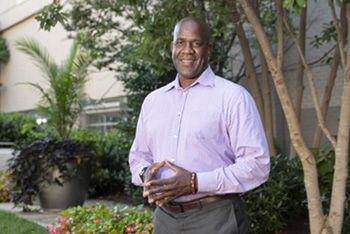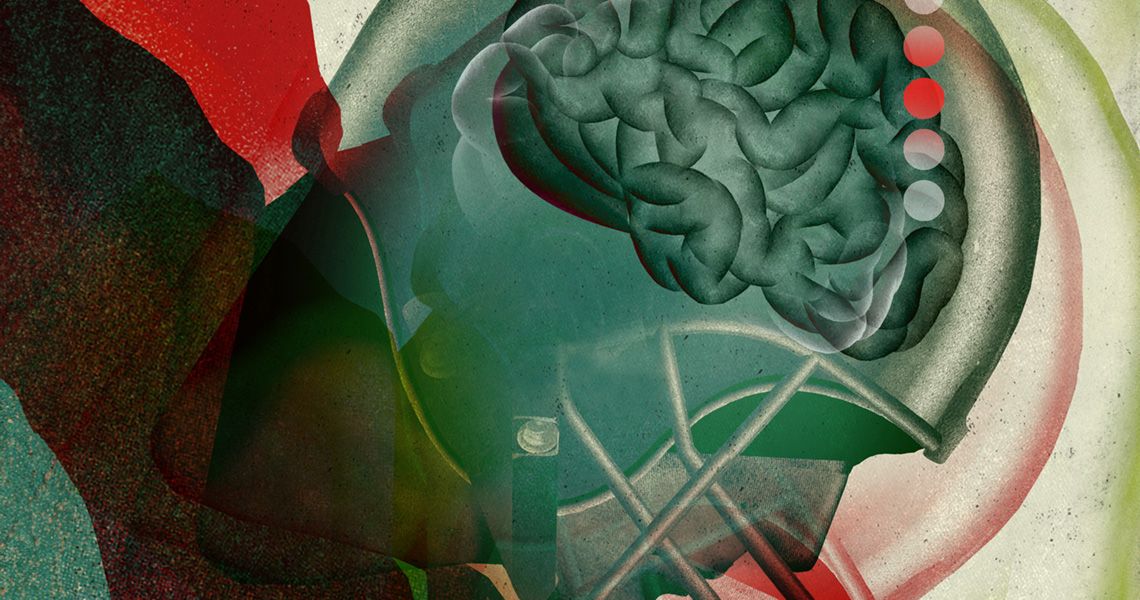When Robert W. Turner II, PhD, asks Black men why they have not participated in previous biomedical or translational health research, the collective answer has been swift and direct: “They have never been asked.”
The reason, he explains, is “there has been persistent under-representation of Black participants in biomedical and health research, including studies on the late effects of repetitive head injuries (RHI) from American football play.”

Turner, an assistant professor of clinical research and leadership at the George Washington University (GW) School of Medicine and Health Sciences (SMHS), is looking to change that and make a substantive difference on the long-term health of this often-overlooked community. He is the principal investigator for a National Institutes of Health-funded study: “The Contribution of Repetitive Head Impacts and Social Determinants of Health to Brain Aging in Older Adult Black Men.”
The $6.3 million study is a three-site project, with Boston University and the Duke University and University of North Carolina at Chapel Hill Alzheimer’s Disease Research Center partnering with GW. With the support of the R01 grant, researchers will examine the impact of repetitive head impacts and traumatic brain injury (RHI/TBI) stemming from American football and the impact of social determinants of health (SDOH), particularly early-life factors, on late-life cognitive function, neuropsychiatric symptoms, and structural/diffusion MRI features in Black men.
Turner believes the evidence will show that RHI/TBI is associated with worse cognitive and neuropsychiatric function and compromised structural gray/white matter brain metrics in Black former football players. Researchers will also look to determine whether early-life impoverished SDOH will increase risk and reduce resilience to the late-life effects of RHI, or if impoverished SDOH will mediate the effects of RHI on late-life neuropsychiatric and neurological outcomes.
Through the study, Turner and his peers will recruit two groups of participants, 100 former American football athletes who are 50 years or older (across all levels of play and cognitive continuum) and 100 age-matched Black males without RHI/TBI. Biospecimens, MRIs, blood draws, urine samples, and neurocognitive assessments will be collected at Duke University and Boston University. Members of the R.W. Turner Lab will collect SDOH data at GW. Turner will also discuss lived experiences with both study groups.
“No study exists, that I know of, that focuses solely on Black men in the 50-plus age range,” Turner says, adding that Black men in particular, have been underrepresented in Alzheimer’s and dementia research. “Black people make up five percent of all Alzheimer’s/dementia research with 75 percent of that group being women and 25 percent men. Historically, whatever recruiting methods we have used have not been successful in recruiting Black men. We need to better understand what the inhibitors are.”
Turner understands the sport, and its promises and pitfalls, well. His ties to football extend 16 years as an athlete playing in high school, college, and the pros in the original USFL, NFL, and the Canadian Football League. Despite the limited research focused on Black men, he says, 70 percent of National Football League players are Black and nearly 60 percent of NCAA Division I college football players are Black. And, according to the University of Pittsburgh Medical Center, roughly 300,000 athletes — from youth-level to the pros — suffer concussions each year playing football.
In addition to RHI/TBI effects, Turner and his peers are examining social determinants of health risk factors as a barrier to receiving care. COVID-19 was one example that highlighted the stress placed upon many people who live in food deserts and do not have adequate access to health insurance. “All of those things lead back to core brain health,” Turner says. “We want to better understand those factors in the context of brain health. It is not enough to identify those gaps. What explains the gap?”
According to the National Institute on Aging, Black participants in Alzheimer’s disease research studies were 35 percent less likely to be diagnosed with Alzheimer’s and related dementias than white participants, despite national statistics that indicate Black Americans are twice as likely to develop dementia as caucasians. Turner’s goal is to better understand the entirety of Alzheimer’s among Black men. “Does it function the same way for men who played sports and didn’t play sports?” Turner says. “To address Alzheimer’s and chronic traumatic encephalopathy, we need to understand this population. How are these risk factors, treatments, and access issues influencing this population?”
Considering the primary study location is Washington, D.C., with Boston University and the Alzheimer’s Disease Research Center covering New England and both Carolina regions, researchers will have access to more than half a dozen NFL teams in the South, Mid-Atlantic, and Northeast that will be within a two-hour flight, train ride, or car trip. “With the large Black populations in DC, Boston, Baltimore, Philadelphia, New York City, and Atlanta — we can get people on flights and train rides to conduct in-person data collection,” Turner says.
Turner’s efforts have been bolstered by executives within the NFL Alumni Association. Brad Edwards, the organization CEO, and Bart Oates, the association president, have worked along with Turner in the past to improve the overall health of former NFL players. Turner has also partnered with the Alzheimer’s Association.
This five-year grant gives Turner a challenging turnaround time. “We are hoping to complete data collection within the first four years,” Turner says.
The ambitious project relies on efforts by Turner’s peers at GW. “I am very grateful to Dr. Leslie Davidson [chair of the Department of Clinical Research and Leadership at GW SMHS] for the support and encouragement to secure this grant for such an innovative study,” Turner says.
Turner, the author of “Not For Long: The Life and Career of the NFL Athlete” and co-principal investigator for the Black Men’s Brain Health Emerging Scholars program, is heartened by both the reaction of former football players and having the chance to share their personal life experiences. “There is a great deal of enthusiasm in the football community,” he says. “Finally someone is asking them to participate.”




